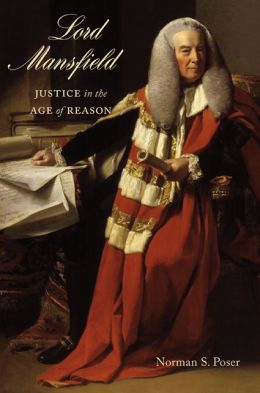New from McGill-Queen's University Press:
Norman S. Poser,
Lord Mansfield: Justice in the Age of Reason (2013). Poser is professor emeritus at Brooklyn Law School. A description from the publisher:
In the first modern biography of Lord Mansfield (1705-1793), Norman
Poser details the turbulent political life of eighteenth-century
Britain's most powerful judge, serving as chief justice for an
unprecedented thirty-two years. His legal decisions launched England on
the path to abolishing slavery and the slave trade, modernized
commercial law in ways that helped establish Britain as the world's
leading industrial and trading nation, and his vigorous opposition to
the American colonists stoked Revolutionary fires. Although his father
and brother were Jacobite rebels loyal to the deposed King James II,
Mansfield was able to rise through English society to become a member of
its ruling aristocracy and a confidential advisor to two kings. Poser
sets Mansfield's rulings in historical context while delving into
Mansfield's circle, which included poets (Alexander Pope described him
as "his country's pride"), artists, actors, clergymen, noblemen and
women, and politicians. Still celebrated for his application of common
sense and moral values to the formal and complicated English common law
system, Mansfield brought a practical and humanistic approach to the
law. His decisions continue to influence the legal systems of Canada,
Britain, and the United States to an extent unmatched by any judge of
the past. An illuminating account of one of the greatest legal minds,
Lord Mansfield presents a vibrant look at Britain's Age of Reason
through one of its central figures.
A few blurbs:
"I read this book with much pleasure and instruction. It admirably
fills a major gap in the body of legal historical literature - the
absence of a comprehensive biography of arguably the most famous and
influential Anglo-American judge of the modern era." -- Simon Devereaux
"A
remarkable portrait of both a man and a legal age. I enjoyed the book
tremendously, learned so much, and am deeply grateful. A master work."
-- Kent Syverud
